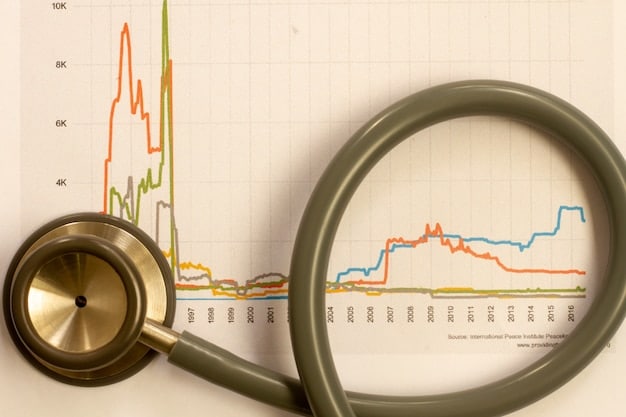Understanding Rising Healthcare Costs and Your Finances in 2025

Understanding the impact of rising healthcare costs on your personal finances in 2025 is crucial for effective budgeting, insurance planning, and long-term financial stability, requiring proactive strategies to mitigate increased expenses.
Navigating the landscape of personal finance requires a keen awareness of various economic factors, and few are as impactful as healthcare costs. Understanding the impact of rising healthcare costs on your personal finances in 2025 is not just about knowing that expenses are increasing; it’s about preparing for those increases and mitigating their effects on your financial well-being. Let’s explore how these rising costs may affect you and what strategies you can employ to safeguard your financial future.
The Current State of Healthcare Costs in the US
The United States has long grappled with high healthcare expenses, and trends indicate that these costs will continue to rise. Understanding the factors driving these increases is essential for anyone looking to manage their personal finances effectively.
Key Drivers of Rising Costs
Several factors contribute to the escalating costs of healthcare in the US. These include advancements in medical technology, an aging population, and increasing rates of chronic diseases.
- Technological Advancements: New medical technologies and pharmaceuticals often come with a high price tag.
- Aging Population: As the population ages, the demand for healthcare services increases, driving up overall costs.
- Chronic Diseases: The prevalence of chronic conditions like diabetes and heart disease requires ongoing treatment, contributing to higher healthcare spending.
Beyond these factors, administrative expenses and the complexity of the healthcare system also play a significant role in driving up costs. Streamlining processes and reducing administrative overhead could potentially lead to savings.

In conclusion, the rising healthcare costs in the US are a complex issue influenced by various factors. Recognizing these drivers is the first step toward understanding how to manage their impact on your personal finances effectively.
Projected Healthcare Cost Increases for 2025
Looking ahead to 2025, projections indicate that healthcare costs will continue their upward trajectory. Several organizations and experts have provided estimates that can help individuals prepare for these changes.
Expert Predictions and Reports
Various sources provide insights into the anticipated increases in healthcare costs for 2025. These predictions are based on current trends, economic forecasts, and policy changes.
According to reports from organizations like the Centers for Medicare & Medicaid Services (CMS), healthcare spending is expected to grow at an average annual rate of over 5% in the coming years. This growth rate outpaces general inflation, meaning healthcare will consume a larger portion of household budgets.
- Employer-Sponsored Plans: Employers are likely to pass on some of these cost increases to employees through higher premiums and out-of-pocket expenses.
- Individual Market: Individuals purchasing insurance through the Affordable Care Act (ACA) marketplaces may also see premium increases, although subsidies can help offset some of these costs.
- Medicare and Medicaid: Government-funded healthcare programs will also face increased financial pressures, potentially leading to changes in coverage or benefits.
Considering these projections, it’s essential to review your current healthcare coverage and explore options for reducing your expenses. This might include switching to a lower-cost plan, increasing your deductible, or utilizing tax-advantaged accounts for healthcare savings.
In summary, projections for 2025 suggest that healthcare costs will continue to rise, impacting individuals, employers, and government programs alike. Planning ahead and exploring cost-saving strategies can help mitigate these financial pressures.
How Rising Costs Affect Your Personal Budget
The increase in healthcare costs directly affects your personal budget. These costs can impact everything from your monthly expenses to your long-term savings and retirement plans.
Direct and Indirect Impacts
Rising healthcare expenses can affect your budget in several ways, both directly and indirectly. Understanding these impacts can help you better allocate your resources and make informed financial decisions.
Direct impacts include higher insurance premiums, increased out-of-pocket costs (such as deductibles and copays), and the cost of prescription medications. These expenses can quickly add up, especially if you have chronic health conditions or require frequent medical care.

Indirect impacts can include reduced savings, delayed retirement, and increased debt. When healthcare expenses consume a larger portion of your income, you may have less money available for other financial goals, such as saving for retirement or paying down debt.
In conclusion, rising healthcare costs have a multifaceted impact on your personal budget, affecting both short-term expenses and long-term financial goals. By understanding these impacts, you can develop a financial plan that addresses your healthcare needs while also prioritizing your other financial objectives.
Strategies to Lower Healthcare Expenses
While healthcare costs are rising, there are several strategies you can employ to lower your expenses and protect your personal finances. These strategies range from choosing the right insurance plan to adopting healthy lifestyle habits.
Insurance and Coverage Options
One of the most effective ways to manage healthcare costs is by selecting the right insurance plan. Consider your healthcare needs, budget, and risk tolerance when choosing a plan.
- High-Deductible Health Plans (HDHPs): These plans typically have lower premiums but higher deductibles. They can be a good option if you are generally healthy and don’t require frequent medical care.
- Health Maintenance Organizations (HMOs): HMOs usually require you to choose a primary care physician who coordinates your care and refers you to specialists. They often have lower out-of-pocket costs but less flexibility in choosing providers.
- Preferred Provider Organizations (PPOs): PPOs offer more flexibility in choosing providers, but they typically have higher premiums and out-of-pocket costs.
In addition to choosing the right plan, take advantage of preventive care services covered by your insurance. Regular check-ups and screenings can help detect health issues early, preventing more costly treatments down the road.
In conclusion, selecting the right insurance plan is crucial for managing healthcare expenses. By carefully considering your needs and options, you can find a plan that provides adequate coverage at a reasonable cost.
The Role of Preventative Care and Wellness Programs
Preventative care and wellness programs can play an important role in managing healthcare costs. By focusing on maintaining good health, you can reduce your risk of developing chronic diseases and requiring costly medical treatments.
Benefits of Preventative Measures
Preventative care includes regular check-ups, screenings, and vaccinations. These measures can help detect health issues early when they are often easier and less expensive to treat.
Wellness programs, offered by many employers and insurance companies, provide resources and incentives for adopting healthy lifestyle habits. These programs may include smoking cessation programs, weight management programs, and stress reduction workshops.
By prioritizing preventative care and participating in wellness programs, you can reduce your risk of developing chronic diseases, lower your healthcare expenses, and improve your overall quality of life. Furthermore, many insurance plans cover preventative services at no cost, making them an affordable and accessible way to manage your health.
In summary, preventative care and wellness programs are valuable tools for managing healthcare costs and promoting long-term health. By taking proactive steps to maintain your well-being, you can reduce your risk of costly medical treatments and improve your overall financial stability.
Financial Planning for Future Healthcare Needs
Planning ahead for future healthcare needs is essential for long-term financial security. By incorporating healthcare expenses into your financial plan, you can avoid unexpected costs and ensure that you have the resources to cover your medical needs.
Strategies for Long-Term Planning
Several strategies can help you plan for future healthcare needs, including budgeting, saving, and investing. Start by estimating your potential healthcare expenses based on your age, health status, and family history.
- Health Savings Accounts (HSAs): If you have a high-deductible health plan, consider contributing to an HSA. These accounts offer tax advantages for healthcare savings.
- Retirement Accounts: Designate a portion of your retirement savings for healthcare expenses. Factor in potential long-term care costs when planning your retirement budget.
- Long-Term Care Insurance: Consider purchasing long-term care insurance to cover the costs of nursing home care or home healthcare services if you anticipate needing them in the future.
Review your financial plan regularly and adjust it as needed based on changes in your health, income, and healthcare costs. By taking a proactive approach to financial planning, you can ensure that you are prepared for future healthcare needs.
In conclusion, financial planning for future healthcare needs is a critical component of long-term financial security. By incorporating healthcare expenses into your financial plan and utilizing various savings and insurance strategies, you can protect your financial well-being and ensure that you have the resources to cover your medical needs in the future.
| Key Point | Brief Description |
|---|---|
| 💰 Rising Costs | Healthcare expenses are projected to increase, impacting budgets. |
| ⚕️ Insurance Options | Choosing the right plan is crucial for managing expenses. |
| 💪 Preventative Care | Maintaining health can reduce the need for costly treatments. |
| 📝 Financial Planning | Planning ahead ensures you have funds for future healthcare needs. |
Frequently Asked Questions
▼
Rising costs are driven by factors like technological advancements, an aging population, increasing chronic diseases, and administrative complexity within the healthcare system.
▼
Consider high-deductible health plans, compare different insurance providers, and take advantage of employer-sponsored wellness programs to reduce premiums.
▼
An HSA is a tax-advantaged savings account available to individuals with high-deductible health plans, used to pay for qualified medical expenses.
▼
Preventative care helps detect health issues early, reducing the need for expensive treatments and improving long-term health outcomes, thus saving money.
▼
Consider purchasing long-term care insurance, allocating retirement savings for healthcare, and exploring government assistance programs to cover potential costs.
Conclusion
Understanding the impact of rising healthcare costs on your personal finances in 2025 is crucial for safeguarding your future financial well-being. By employing proactive strategies such as choosing the right insurance plan, prioritizing preventative care, and engaging in thoughtful financial planning, you can effectively manage healthcare expenses and maintain financial stability. Staying informed and adaptable in the face of these financial challenges will ensure a more secure and healthy future.





